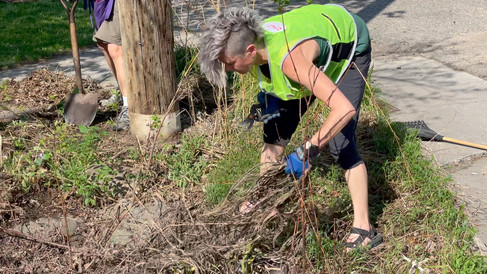Rain Garden Workshop Success!
- info9589284
- May 20, 2022
- 2 min read
An entire scout troop, a church group, members of the Thursday Noon Rotary Club plus 17 individual volunteers work to maintain rain gardens in Stillwater. In addition to these volunteers, homeowners around town take pride in their rain gardens and maintain them themselves. They often cite an important reason for hosting their rain garden—it diverts run-off water and dissolved pollutants in the water from reaching our rivers and lakes. But sometimes a rain garden can overwhelm the person or people managing it. Volunteers and homeowners need to know that consultation about rain garden problems is just an email away via a form on the Washington Conservation District website. A staff member from WCD will arrange for a site visit to evaluate the problem or problems gardeners are experiencing.

A rain garden is a different kind of garden. Frequently native plants will have been installed in rain gardens. These plants have been chosen because they have deep or fibrous roots to slow and sequester flowing water. Native plants also are a “little grocery store in a food desert” for butterfly and moth larvae and adults. They are attractive to a multitude of pollinator species. Our rain gardens help to make Stillwater's Bird City appellation a reality.
On May 12, seventeen residents with keen interest in rain gardens took part in a hands-on workshop that focused on garden maintenance. Attendees wore sensible clothes and shoes and brought favorite tools from home. Brett Stolpestad, Senior Landscape Restoration Technician from the Washington Conservation District, talked about rain gardens. Some “Pretty Good Gardeners” who had been invited to be part of the program offered their suggestions for removal of invasive perennials and volunteer saplings. Then the group got “down in the dirt.” Little saplings were dug out, roots of unwanted grasses were disentangled from the root ball of valued plants, and the dry debris from last year's top growth was raked away.
We worked along West Wilkins Street, where rain gardens stretch for eight blocks. These gardens are especially glorious in the fall, when New England aster bloom in every plot. Many species of bees feast on their nectar and pollen. The May 12 event lasted for two hours. What might long-term effects of the rain garden maintenance workshop be? I believe the volunteers and homeowners in attendance were energized by each other as they worked shoulder to shoulder. New volunteers were empowered by the firm optimism and new techniques maintenance veterans shared. And the group (both attendees and those who were invited but could not come) now knows that Sustainable Stillwater has an interest in rejuvenating degraded rain gardens. Most importantly, they understand that Washington Conservation District has their backs and is a resource they can tap into for consultation and advice.
Ruth Alliband
Rain Garden Maintenance Coordinator
300_edited.png)



































Comments